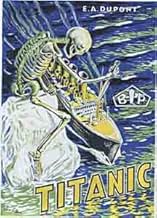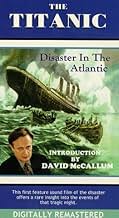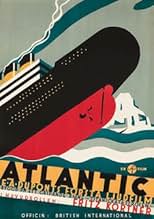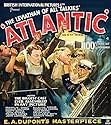अपनी भाषा में प्लॉट जोड़ेंOn its maiden voyage in April 1912, the supposedly unsinkable RMS Titanic hits an iceberg in the Atlantic Ocean.On its maiden voyage in April 1912, the supposedly unsinkable RMS Titanic hits an iceberg in the Atlantic Ocean.On its maiden voyage in April 1912, the supposedly unsinkable RMS Titanic hits an iceberg in the Atlantic Ocean.
- निर्देशक
- लेखक
- स्टार
Gordon James
- Capt. Collins
- (as Sydney Lynn)
फ़ीचर्ड समीक्षाएं
From what I understand this was the first movie about the RMS Titanic that featured sound and it was produced in English, German and French (along with a silent version as well). The title was changed to "Atlantic" for fear of lawsuits. In any case, this film essentially depicts a small handful of passengers who have some interpersonal drama going on both before and after the ship hits the iceberg and begins to sink. Initially, most of the passengers are unaware that the ship is sinking which compounds the problem even more. At least that is the scenario that is portrayed in this particular film. Whether any of that is true or not is unknown to me. Be that as it may, I believe that in order for a person to enjoy this movie it is necessary to appreciate the era in which this film was made and for the viewer to make certain allowances for that fact. Likewise, although there have certainly been better films produced pertaining to the subject at hand, this is still a decent movie overall and I have rated it accordingly. Slightly above average.
let me firstly say that too many of these reviewers ,particularly the film student,are viewing the film in a modern context and not as a film made at the coming of sound.In an interview given by John Longden for the BBCs programme "Yesterdays witness" he stated that the ridiculously long pauses between dialogue were entirely the idea of the director.So it is unfair to blame the actors for this.Also in that same programme sound men were interviewed.They said that the effects were recorded on a liner berthed at Tilbury.The ship was linked by phone line to Elstree studios.Before each effect someone would come on the line to describe the effect and it would be recorded at Elstree.The problems with early sound films were quite apparent here.few directors here or in America had the skill of Hitchcock in adapting to the new medium.In fact one should praise the attempt to tell the story in what was then effectively a new medium rather than decry the effort some 84 years later because it is old fashioned.no doubt in the year 2097 young film students will be looking at the like of Man of Steel and chuckling at its antique quaintness.
I purchased this film on DVD to add to my collection of Madeleine Carroll films, and although the stunningly beautiful actress does not have a tremendous amount of screen time, I was not disappointed in the final product. I've never particularly cared for disaster films, and the Cameron blockbuster of a few years ago left me decidedly cold, as it were. Not being an expert on the events surrounding the sinking, I was still quite sure that this mega-hit had little relation to what actually transpired on that fateful night. In any event, I am convinced that the film under review is of greater historical accuracy, and unlike the other reviewers, I am not particularly discouraged to discover that a film made almost 80 years ago is not quite as "spiffy" as more recent products. At the very least, films of this type should be regarded as valuable documents of the ways things were done in the not too distant past, and when you realize that "Atlantic" was made a mere 17 years after the Titanic went down, that is all the more reason to cherish it as an invaluable time capsule of a significant event in the annals of the 20th century that still apparently fascinates a great many people.
As far as the individual performances are concerned, I thought that the players effectively conveyed the starkness of the dilemma the doomed passengers were facing, especially the futility of those remaining men who had hope no hope of salvation, the end being only a matter time. Of particular note was the abrupt contrast between the gay frivolity that permeated the mood immediately before the bad news was conveyed by Lanchester and what immediately followed. Add to that Monica's frantic separation from her husband, as she was literally dragged on to the hanging lifeboat, was quite poignant, made all the more so when the news that she was pregnant became known later.
For those interested in a well made vintage film that provides a fascinating look at a sensational event with which practically everyone alive has at least some inkling of, I highly recommend this film. (And there's the added bonus of a very young Madeleine Carroll to feast your eyes on).
As far as the individual performances are concerned, I thought that the players effectively conveyed the starkness of the dilemma the doomed passengers were facing, especially the futility of those remaining men who had hope no hope of salvation, the end being only a matter time. Of particular note was the abrupt contrast between the gay frivolity that permeated the mood immediately before the bad news was conveyed by Lanchester and what immediately followed. Add to that Monica's frantic separation from her husband, as she was literally dragged on to the hanging lifeboat, was quite poignant, made all the more so when the news that she was pregnant became known later.
For those interested in a well made vintage film that provides a fascinating look at a sensational event with which practically everyone alive has at least some inkling of, I highly recommend this film. (And there's the added bonus of a very young Madeleine Carroll to feast your eyes on).
Yes I know "talkies" had just been invented for the cinema 2 years earlier when this was produced in 1929 but this film showed that much had to learnt about the art of producing films.It comes over as a filmed "hammy" stage play with the actors melodramatically enunciating their lines,rolling their eyes, using too many pregnant pauses and using gestures more appropriate to silent cinema, which I suppose was normal during the process of educating them to appear more naturalistic on screen.The gaps between lines spoken should have been tightened up during editing as it considerably slows the film.It is now only of interest for Titanic buffs who want to see an early example of this marine accident on film.In next chronological order they could see "Titanic" (1953) A Night to Remember (1958)"Titanic (1997), to see how the cinema's depiction of this tragedy as evolved over the years.There have been many documentaries and TV films made including the atrocious "SOS Titanic" (1979) On my version which is a DVD, David McCallum gives the introduction.It was he who played Harold Bride Marconi's junior wireless operator in "A Night to Remember"(still the best feature film - please read my "Tribute to Walter" comments on IMDb under Howard Morley.demon.co.uk)and gave the commentary on the series of 4 videos entitled "End of a Dream" so he was well qualified to give the narration.Of more interest I found was a recording accompanied by actual photos of the 1912 US Senate hearing which is also on the DVD.Actors speak the actual words spoken by Lightoller 2nd officer, J Bruce Ismay,Managing director of White Star, Harold Bride and others including Gloria Stewart (The "old Rose" in Titanic 1997) whose voice is used for one of the first class women survivors.
True this movie is creaky by today's standards. It's a British maritime story & British production directed by a German Expressionists director who himself was getting acquainted with sound at the time. I had waited a long time to see this film in it's entirety when I found a video two-tape copy in a Sam Goodys. Before I had only seen clips of this in Titanic documentaries. If the Producers changed the Title from Titanic to Atlantic it was more in conjunction with the movie being made only 17 years after the real disaster. Many of the survivors' relatives would have been alive and well and lawsuits would have probably abounded from them as well as The White Star Line, the Titanic's owner, which was still up and running and had an image to uphold. Remember at this time the White Star Line considered the Titanic as a ship they'd rather forget. But even with the title being Atlantic the film's makers infringed upon an earlier White Star disaster in 1873 with over 300 lives lost. The ship from the 1873 disaster was called: THE ATLANTIC. The biggest White Star disaster 39 years before the Titanic.
This movie, based on an earlier stage production, was a big undertaking for 1929 sound film. Dupont is obviously a novice with sound technique. Dialogue from characters such as Tate-Hughes is often spoken in a slow-witted fashion presumably for some kind of stage effect. Characters are given names to protect the identities of the real life victims. So Captain EJ Smith-becomes-"The Captain", Charles Lighttoller-becomes-simply "Lanchester", Ben Guggenheim-becomes-"Tate-Hughes" albeit in a wheel chair and so on. Charleston type music is played instead the Ragtime & Waltzes that were actually heard on the Titanic. But Dupont set a standard with this film that all later Titanic films imitated in one way or another. This film shows the goings-on on the bridge, scenes of the engine room(pretty good by the way), the effects on important first class passengers, the steerage passengers in the lower holds and the sinking, while very stagey, is handled poignantly with the cast singing Nearer My God To Thee...this was imitated in the 1953 Titanic w/Barbara Stanwyck. But there was no visual aspect of the actual ship sinking. Perhaps a bit to harrowing to portray since it was only 17 years and the disaster would've still been fresh in some survivors minds.
Most Titanic buffs should want to see this just to see how 1929 audiences would have handled the sinking of the Titanic as told through a fictional ship called Atlantic. It's an obvious story on the Titanic but done to protect survivors & relatives of which many were living at the time. Seeing this, one can compare it to Titanic(1953), A Night To Remember(1958 classic), the made for tv S.O.S Titanic(1979) or the recent James Cameron Oscar winner. I would give it just for historical purposes 2 1/2 stars out of 4.
This movie, based on an earlier stage production, was a big undertaking for 1929 sound film. Dupont is obviously a novice with sound technique. Dialogue from characters such as Tate-Hughes is often spoken in a slow-witted fashion presumably for some kind of stage effect. Characters are given names to protect the identities of the real life victims. So Captain EJ Smith-becomes-"The Captain", Charles Lighttoller-becomes-simply "Lanchester", Ben Guggenheim-becomes-"Tate-Hughes" albeit in a wheel chair and so on. Charleston type music is played instead the Ragtime & Waltzes that were actually heard on the Titanic. But Dupont set a standard with this film that all later Titanic films imitated in one way or another. This film shows the goings-on on the bridge, scenes of the engine room(pretty good by the way), the effects on important first class passengers, the steerage passengers in the lower holds and the sinking, while very stagey, is handled poignantly with the cast singing Nearer My God To Thee...this was imitated in the 1953 Titanic w/Barbara Stanwyck. But there was no visual aspect of the actual ship sinking. Perhaps a bit to harrowing to portray since it was only 17 years and the disaster would've still been fresh in some survivors minds.
Most Titanic buffs should want to see this just to see how 1929 audiences would have handled the sinking of the Titanic as told through a fictional ship called Atlantic. It's an obvious story on the Titanic but done to protect survivors & relatives of which many were living at the time. Seeing this, one can compare it to Titanic(1953), A Night To Remember(1958 classic), the made for tv S.O.S Titanic(1979) or the recent James Cameron Oscar winner. I would give it just for historical purposes 2 1/2 stars out of 4.
क्या आपको पता है
- ट्रिवियाThe White Star Line forbade the production company from referring to the ship in this film as The Titanic.
- गूफ़Set in 1912, he women's hairstyle and dresses are from 1929.
- इसके अलावा अन्य वर्जनReleased with separate English, French and German soundtracks.
- साउंडट्रैकWalking With Susie
(uncredited)
Written by G.H. Elliott
Played by the ship's band as Larry and Monica enter the Smoking Room.
टॉप पसंद
रेटिंग देने के लिए साइन-इन करें और वैयक्तिकृत सुझावों के लिए वॉचलिस्ट करें
विवरण
- रिलीज़ की तारीख़
- कंट्री ऑफ़ ओरिजिन
- भाषा
- इस रूप में भी जाना जाता है
- Titanic: Disaster in the Atlantic
- फ़िल्माने की जगहें
- उत्पादन कंपनी
- IMDbPro पर और कंपनी क्रेडिट देखें
बॉक्स ऑफ़िस
- बजट
- £2,000(अनुमानित)
- चलने की अवधि1 घंटा 30 मिनट
- रंग
- पक्ष अनुपात
- 1.20 : 1
इस पेज में योगदान दें
किसी बदलाव का सुझाव दें या अनुपलब्ध कॉन्टेंट जोड़ें



































